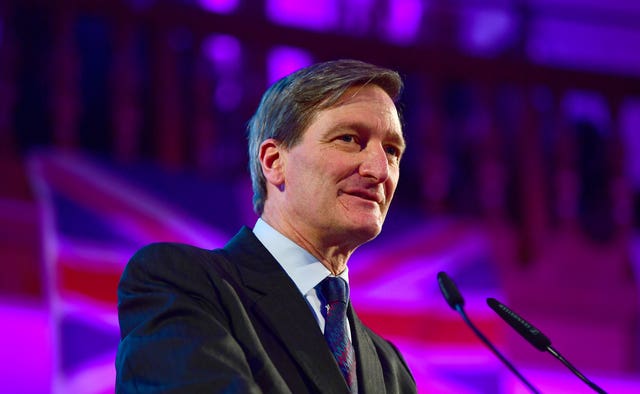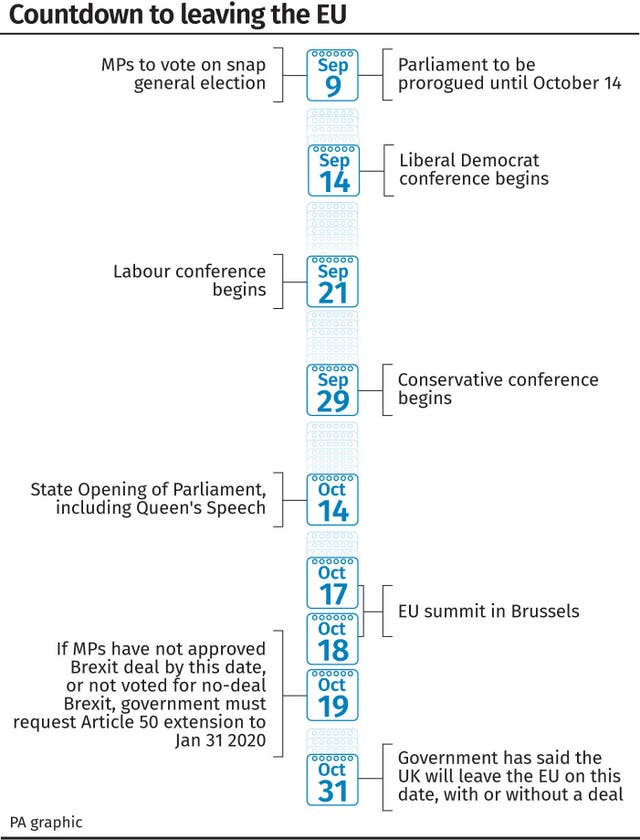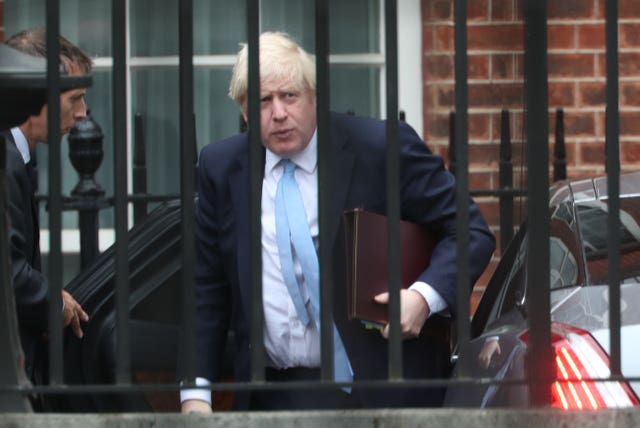Boris Johnson’s Government has been told to publish communications connected to prorogation and no-deal Brexit planning after MPs supported an emergency Commons motion.
Former attorney general Dominic Grieve’s demand for all written and electronic contact about the temporary suspension of Parliament and Operation Yellowhammer documents since July 23 to be released was approved by 311 votes to 302, a majority of nine.
He used the parliamentary device of a humble address to the Queen to ask for the documents to be put before the Commons by ministers by no later than 11pm on Wednesday.
‘This matter smacked of scandal’
Mr Grieve, now sitting as an independent MP after losing his place in the Tory party, said public officials had given him information relating to prorogation that informed him “they believed the handling of this matter smacked of scandal”.

He told MPs: “That places me in a difficulty because it is simply the information that I’ve been given and I want to make absolutely clear that I’m not in a position, any more than I think any member in this House is, to be able to ascertain if that information is mistaken or not.
“I can only say that I believe those sources to be reliable and also, in my experience, it is extraordinarily unusual that I should get such approaches with individuals expressing their disquiet about the handling of this matter and some of the underlying issues to which it could give rise.”
Mr Grieve’s motion asked for all correspondence and communications, formal or informal, including WhatsApp, Telegram, Signal, Facebook Messenger, private email accounts, text messages, iMessage and official and personal mobile phones connected to the present Government since July 23 relating to prorogation.
It lists key individuals of Mr Johnson’s Government, including senior adviser Dominic Cummings and director of legislative affairs Nikki da Costa.
Number 10 lied about not suspending parliament after Boris Johnson had already approved it
The demand came after documents released in a Scottish court showed Mr Johnson appeared to have approved the prorogation on August 15, despite subsequent official denials and the public announcement being made nearly two weeks later, on August 28.
Attorney General Geoffrey Cox asked what legal right the Government would have to require its employees to “give up private email accounts and personal mobiles”.
He said if there is no legal right, the humble address may not be enforceable.
Mr Grieve replied: “These are Government employees and in the course of their work it is their duty to observe the Civil Service code and to comply with its requirements including, I would respectfully suggest to my right honourable friend the Attorney General, not using private means of communication to carry out official business.”
Mr Cox added: “It is a blunt instrument and in truth what this humble address requires is careful refinement so that it complies with legal rules.”
The Attorney General said there would be a potential binding effect on the Government, but not on individuals. He said the humble address risked a “trespass on fundamental rights of individuals”.

Parliament ‘shut down to prevent scrutiny’
Shadow Brexit secretary Sir Keir Starmer said the Government must be more open and honest with Parliament about the impact of a no-deal Brexit.
He said: “The basic lack of trust that exists between the House and the executive is eroding day by day and it is extraordinary to shut down Parliament at this time.
“It is blindingly obvious why we are being shut down, to prevent scrutiny, as there can be no scrutiny if we are not sitting.”
Sir Keir called on the Government to provide information regarding the impact of a no-deal Brexit to MPs at the soonest opportunity.
SNP MP for Livingston Hannah Bardell said: “That is information that should have been given to the people well ahead of the referendum, and now we’re in the position where we’re having kamikaze-like behaviour from individuals who are going to damage the lives of our constituents.”
Tory MP for Redditch Rachel Maclean said her constituents were watching Parliament with “astonishment and frustration” seeing a Commons “completely out of touch” with people.
Conservative former environment secretary Owen Paterson said nine named individuals were largely in “junior” posts.
He added: “I just think before this witch hunt atmosphere continues, would members opposite like to consider they are talking about nine relatively junior members assisting the Government.”
Chancellor of the Duchy of Lancaster Michael Gove called the motion a “fishing expedition”.
On Operation Yellowhammer, Mr Gove said: “The Government is absolutely committed to sharing with this House as much as we can.”
A Government spokesman said in a statement after the vote: “We are disappointed that this Humble Address has passed.
“The Government is committed to sharing appropriate information with Parliament, but we must balance this obligation with the broader public interest, our legal duties and the assurance that ministers can receive full and frank advice that will remain confidential.
“The scope of the information requested in the Humble Address is disproportionate and unprecedented. We will consider the implications of this vote and respond in due course.”

PM covering up no-deal Brexit damage, says Gordon Brown
Former prime minister Gordon Brown has accused Boris Johnson of “hiding the information from the country” about the “devastating” impact of a no-deal Brexit.
As Downing Street confirmed that Parliament will be prorogued at the close of business on Monday, Mr Brown warned that leaving the European Union without a deal in place could hit imports of food and medicine.
And he insisted Boris Johnson must answer questions on such matters.

The former Labour leader said: “Boris Johnson and his ministers say that Britain is taking back control.
“But in reality, Britain is losing control – of our food supplies, of our medical supplies and of our manufacturing supplies.”
Speaking to the PA news agency before a No To No Deal rally in Glasgow on Monday, Mr Brown said: “I think the truth is, no-deal is a risk to medical supplies, food supplies, a risk to the components that are coming in for British industry, it puts jobs at risk and he’s not wanting that to be debated.
“I think there are internal documents available to ministers that tell them of the risks that they cannot guarantee medical supplies or food supplies, and I think they are avoiding debate on this.
“So, we have a no-deal Brexit, we have a no-debate Brexit, we have a no-democracy Brexit at the moment, and I think he is trying to hide the information from the country.”
Calling for internal Whitehall assessments of the risks of no-deal to be published, Mr Brown stressed that MPs had “an obligation, at all times, to use their judgment to weigh the balance of risks”.
NHS medical supplies at risk
Mr Brown said more than one million consignments of medical supplies arrive in the UK from Europe every day – with these amounting to more than 400 million a year.
He added: “We can stockpile and even fly medicines in, but the commercial director of the National Health Service foresees significant shortages for six months at least, and what he calls ‘serious shortages’ for three months.”
This could have an impact on supplies of the EpiPens used to treat allergic reactions, flu vaccines, radio isotopes used in cancer treatment, and the insulin needed to keep diabetes sufferers alive, the former PM said.
He also spoke out about the impact a no-deal Brexit could have on fresh food, noting that 28% of the UK’s food comes directly from the EU – with a further 11% coming from countries that have trade agreements with the EU.

PM ‘ideologically obsessed
The Prime Minister was accused of being “ideologically obsessed” with exiting the EU and “not looking at the facts that are before him”.
Mr Brown said: “When people are obsessed and become dogmatic and not pragmatic, and when they think they have to deliver something irrespective of the consequences, then they don’t look at the effects on ordinary people’s lives.”

He said: “We’ve got an amazing situation here – after only a few weeks as Prime Minister, he has difficulties with Parliament and he closes it down, he has difficulties with his ministers and he shuts them up, he has difficulty with his party and he throws the members out, he’s got difficulty with the constitution and he simply tears it apart, and of course he has difficulty with the law and he seems willing to consider breaking it.
“No government should be able to ride roughshod over the opinions of Parliament and when a law has been passed banning him from delivering a no-deal Brexit on October 31, he should be obeying it.”
He called on members of the public to make their views known about exiting the EU without an agreement, pointing to problems with food and medical supplies.
Mr Brown said a general election should come “at some point” but not before it is no longer possible for the Government to use it to push through a no-deal Brexit against the wishes of Parliament.
“It’s important to recognise that when the general election comes, Boris Johnson will have to answer for why he is riding roughshod over Parliament.”

